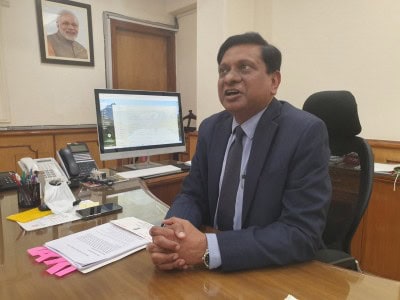 Navneet Mishra
Navneet Mishra
New Delhi, Feb 8 : Senior IAS officer and Secretary in the Ministry of Labour and Employment, Apurva Chandra, said on Monday that the government is considering the objections raised by the trade unions to 12-hour daily work shift.
“See, there will be a maximum of 48 hours of work in a week. If someone works for 8 hours a day, then there will be 6 working days per week. If a company opts for 12-hour working per day for its employees, it means four-day working and three holidays,” Chandra told IANS at the Shram Shakti Bhawan here on Monday.
The senior 1988-batch IAS officer of the Maharashtra cadre, who has been Secretary in the Ministry of Labour and Employment since October 2020, said: “If daily working hours are increased, you will have to give the workers similar holidays also. There will be 5 or 4 working days if duty hours are increased. It will now be mutually agreed to by the employees and employers as to what is appropriate for them. No one will be able to work for 12 hours a day.”
The Ministry is engaged in formulating relevant rules and regulations to implement the four new Labour Codes in the next few weeks to usher in labour reforms. The new labour laws will not compromise the interests of labourers and employees in any way, Chandra said.
“Rules and regulations are now being framed on provisions related to working hours. There is no final word as yet. Once the rules are formulated, things will become more clear. The Ministry wishes to assure that establishments will not be able to exploit their employees at any cost.”
“For the first time, all types of workers in the country will now get minimum wages. New schemes are being brought in for migrant labourers. Provident fund facility will be given to ensure social security to all kinds of labourers. All workers — in organised and unorganised sectors — will be covered by ESI. Women will be allowed to work in all kinds of trade, and allowed to do night shifts.”
Chandra said that the implementation of codes on wages, industrial relations, occupational safety, health and working conditions and social security will ensure social security to all employees.
“The process of making rules under the four Labour Codes is going on. The rules will be ready in the next few weeks.”
The IAS officer said that different state governments will have their own labour laws. “Both central and state governments have the right to make their own rules on this subject. The state governments are independent to make rules and regulations according to their own conditions. However, in case of any confrontation, the rules of the Centre hold precedence,” he said.
The Secretary said that a web portal will be set up for registration of unorganised sector workers by May or June.
“It will enable collection of proper data on registration of workers in the unorganised sector, including migrants, to facilitate formulation of policies on remunerative wages. The labourers registered on the portal will be provided annual free insurance for accidents and disabilities under the Pradhan Mantri Suraksha Bima Yojana,” Chandra added.
Disclaimer: This story is auto-generated from IANS service.

